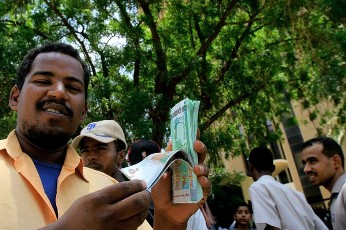No end in sight to Sudan’s currency woes
December 12, 2012 (KHARTOUM) – The Sudanese pound continued sliding further against the U.S. dollar as traders in the black market saw no signs that the persistent shortage in foreign currency will ease anytime soon.
 A deal signed between Sudan and South Sudan last September that would give Khartoum a cut of every oil barrel exported through the north’ s pipelines, is now facing hurdles over security prerequisites that the Sudanese government insists must be concluded first.
A deal signed between Sudan and South Sudan last September that would give Khartoum a cut of every oil barrel exported through the north’ s pipelines, is now facing hurdles over security prerequisites that the Sudanese government insists must be concluded first.
South Sudan was scheduled to resume oil production on Nov. 15 with the first exports to hit markets by January. It was hoped that the restart would provide Sudan with a stable source of hard currency it desperately needs since oil-rich South Sudan seceded last year taking with it 75% of the country’s 450,000-barrel-per-day output.
Sudanese authorities were faced with the dilemma of providing hard currency needed for paying food imports or supporting the local currency against other currencies in a flourishing black market.
The new Sudanese pound rolled out in July of last year was initially set at an official exchange rate of 2.7 to the dollar before the government devalued it to 4.4.
Today the dollar reached 6.8 pounds in the black market compared with 6.5 earlier this month. Other currencies such as the widely traded Saudi Riyal also traded higher against the pound.
The Central Bank now appears virtually helpless in containing the deteriorating exchange rate given its low level of foreign exchange reserves it holds.
Sudan has been seeking cash infusions from Arab countries but was met with little success. A series of announcements made this year including one last November by the central bank that it has received “large” Forex deposits from abroad have done little to impact the exchange rate.
Some observers accuse the government of deliberately feeding false news on Forex receipts in a bid to scare the black market into selling its Forex holdings to ease pressure on the local currency.
Last May a senior CBoS official told Sudan Tribune that he had no knowledge of a government disclosure that a cash transfer was made to Khartoum by a neighboring country.
(ST)
